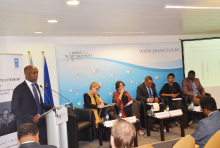
Deprivation and marginalisation, underpinned by weak state governance, are the primary forces driving young Africans towards violent extremism, according to a comprehensive new study by the United Nations Development Programme (UNDP), presented in Brussels on the 23rd of October. The study distils the conditions and factors that shape the dynamics of the radicalisation process that leads some young Africans to join extremist groups.
Based on interviews with 495 voluntary recruits to extremist organisations such as Al-Shabaab and Boko Haram, the new study found that perceived state violence or abuse of power often acts as the final tipping point behind the decision taken by a young person to join an extremist group.
The study reveals a picture of a frustrated young individual, marginalised and neglected over the course of their life, this starting in childhood. With few economic prospects or outlets for meaningful civic participation that can bring about change, and little trust in the state to either provide basic services or respect human rights, the study suggests that such an individual could, upon witnessing or experiencing perceived abuse of power by the state, be tipped over the edge into extremism.
This publication highlights a number of policy recommendations for responding to violent extremism in Africa. One of the main recommendations presented by the study is encouraging states to deliver on global human rights commitments and rights-based approaches to militarised and state-centric counter-terrorism responses. The research underlines key anti-extremism entry points, such as capitalising on religious teaching as a source of resilience, and supporting the voices of traditional religious leaders who challenge misinterpretations of Islam and preach religious tolerance.
The study also highlights the importance of involving trusted local organisations as ‘messengers’ for counter-extremist programmes: “What we know for sure is that in the African context, the counter-extremist messenger is as important as the counter-extremist message” said Mr. Mohamed Yahya, UNDP Africa Regional Programme Coordinator.
The study highlights the need to create viable exit pathways from extremism, especially for young people. It recommends scaling-up amnesty and other exit opportunities for disillusioned recruits and investing in comprehensive rehabilitation and reintegration strategies. At the study’s official presentation event, Ms. Ilwad Elman, Director of Programmes and Development at the Elman Peace and Human Rights Centre, presented some of the programmes that her organisation is implementing in order to rehabilitate young people involved with armed groups in Somalia.
Picture Credits: Bruno Mariani, The Press Club Brussels Europe